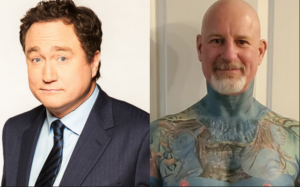NEWSTALK 1010: MARK CRITCH + AVATAR SUPER FAN RAYMOND KNOWLES!
 On this edition of the Richard Crouse Show we meet Mark Critch. He is an actor, comedian and author, who, since 2003 has starred on the political parody show This Hour Has 22 Minutes. He’s photo-bombed Justin Trudeau, offered Pamela Anderson a million dollars to stop acting, and poked fun at characters like Rex Murphy, Don Cherry and Donald Trump.
On this edition of the Richard Crouse Show we meet Mark Critch. He is an actor, comedian and author, who, since 2003 has starred on the political parody show This Hour Has 22 Minutes. He’s photo-bombed Justin Trudeau, offered Pamela Anderson a million dollars to stop acting, and poked fun at characters like Rex Murphy, Don Cherry and Donald Trump.
The show turns thirty years old this season, making it the longest running comedy show on Canadian television. As if that wasn’t enough to keep Mark busy, his other show, the hit CBC sitcom “Son of a Critch,” is now on its second season. The show is a biographical look at growing up in Newfoundland and Labrador, and in a fun twist, he plays his own father on the show.
Then, we get to know Raymond Knowles, and he is the world’s number one Avatar fan. To prove it, he has tattooed 95% of his body with Avatar related tats, named his Edmonton Alberta based carpentry company Mr. Avatar, and has seen the movies more times than you can count.
Listen to the whole thing HERE!
Here’s some info on The Richard Crouse Show!
Each week on the nationally syndicated Richard Crouse Show, Canada’s most recognized movie critic brings together some of the most interesting and opinionated people from the movies, television and music to put a fresh spin on news from the world of lifestyle and pop-culture. Tune into this show to hear in-depth interviews with actors and directors, to find out what’s going on behind the scenes of your favourite shows and movies and get a new take on current trends. Recent guests include Chris Pratt, Elvis Costello, Baz Luhrmann, Martin Freeman, David Cronenberg, Mayim Bialik, The Kids in the Hall and many more!
Listen to the show live here:
C-FAX 1070 in Victoria
SAT 5:00 PM to 6:00 PM
SUN 10:00 AM to 11:00 AM
CJAD in Montreal
SAT 8 PM to 9:00 PM
CFRA in Ottawa
SAT 8 PM to 9:00 PM
NEWSTALK 610 CKTB in St. Catharines
Sat 8:00 PM to 9:00 PM
NEWSTALK 1010 in Toronto
SAT 8 PM to 9:00 PM
NEWSTALK 1290 CJBK
SAT 8 PM to 9:00 PM
AM 1150 in Kelowna
SAT 11 PM to Midnight
BNN BLOOMBERG RADIO 1410
SAT 8 PM to 9:00 PM
Click HERE to catch up on shows you might have missed!








